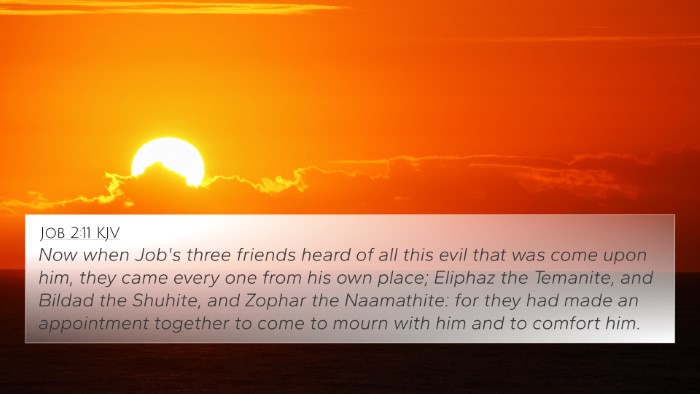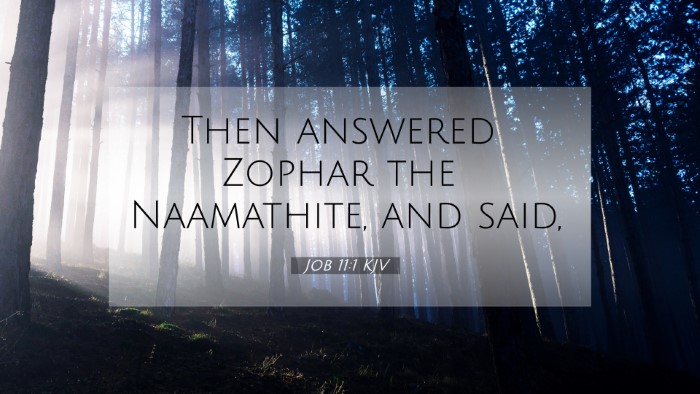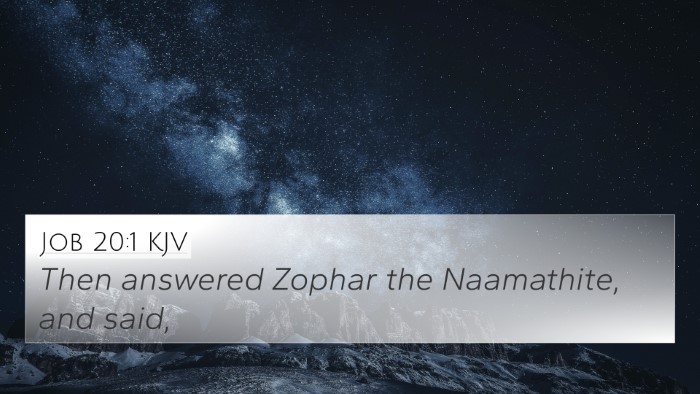Old Testament
Genesis Exodus Leviticus Numbers Deuteronomy Joshua Judges Ruth 1 Samuel 2 Samuel 1 Kings 2 Kings 1 Chronicles 2 Chronicles Ezra Nehemiah Esther Job Psalms Proverbs Ecclesiastes Song of Solomon Isaiah Jeremiah Lamentations Ezekiel Daniel Hosea Joel Amos Obadiah Jonah Micah Nahum Habakkuk Zephaniah Haggai Zechariah MalachiJob 11:1 Similar Verses
Job 11:1 Cross References
Then answered Zophar the Naamathite, and said,
Uncover the Rich Themes and Topics of This Bible Verse
Listed below are the Bible themes associated with Job 11:1. We invite you to explore each theme to gain deeper insights into the Scriptures.
Job 11:1 Cross Reference Verses
This section features a detailed cross-reference designed to enrich your understanding of the Scriptures. Below, you will find carefully selected verses that echo the themes and teachings related to Job 11:1 KJV. Click on any image to explore detailed analyses of related Bible verses and uncover deeper theological insights.

Job 2:11 (KJV) »
Now when Job's three friends heard of all this evil that was come upon him, they came every one from his own place; Eliphaz the Temanite, and Bildad the Shuhite, and Zophar the Naamathite: for they had made an appointment together to come to mourn with him and to comfort him.
Job 11:1 Verse Analysis and Similar Verses
Job 11:1 reads:
"Then answered Zophar the Naamathite, and said," (Job 11:1, KJV).
Summary of Job 11:1
This verse marks the beginning of Zophar's response to Job, where he engages in a critical dialogue regarding Job's situation. Through this, we can see the dynamics of friendship, judgment, and divine wisdom being explored. Zophar, representing the voice of conventional wisdom, unpacks key themes about the human condition before God.
Interpretation Insights from Public Domain Commentaries
- Matthew Henry: Zophar expresses a blunt perspective towards Job, suggesting that Job’s afflictions are a reflection of his hidden sin. Henry points out that Zophar's tragic flaw is his overconfidence in human understanding, appearing harsh in his attempt to 'help' Job.
- Albert Barnes: Barnes mentions that this moment emphasizes the folly of presumption in trying to pronounce on God’s judgments. Zophar embodies the idea that piety should equate to prosperity—a common misconception. The answer reveals much about human nature and our tendency to misjudge suffering.
- Adam Clarke: Clarke delves into Zophar's intent, arguing that he seeks to heighten Job’s repentance through accusation. He opines that Zophar’s thoughts reflect the misguided notion that prosperity is inherently linked to righteousness, thus denoting ignorance to deeper divine truths.
Thematic Connections to Other Scripture
Job 11:1 has valuable cross-references that further enhance its meaning:
- Job 4:7: "Remember, I pray thee, who ever perished, being innocent? or where were the righteous cut off?" This question aligns with Zophar’s insinuation regarding Job’s character.
- Job 8:3: "Doth God pervert judgment? or doth the Almighty pervert justice?" This reflects the traditional view of Zophar’s position on righteousness and reaping what one sows.
- Luke 18:9-14: This parable illustrates the dangers of self-righteousness, similar to Zophar's approach to Job's misfortunes.
- Ezekiel 18:30: "Therefore I will judge you, O house of Israel, every one according to his ways, saith the Lord GOD. Repent, and turn yourselves from all your offences..." This theme of accountability runs parallel to Zophar's claims about Job's need for repentance.
- Proverbs 28:13: "He that covereth his sins shall not prosper: but whoso confesseth and forsaketh them shall have mercy." This concept of confession aligns with Zophar’s implications in his dialogue with Job.
- Psalm 73:12-14: "Behold, these are the ungodly, who prosper in the world; they increase in riches." This highlights the contrasting views of prosperity and piety, reflecting on Zophar’s misguided assumptions.
- 2 Corinthians 5:10: This focuses on the judgment of Christ, which underscores a greater truth about divine justice beyond human comprehension.
Connections Between Bible Verses
Understanding Job 11:1 through comparative verses allows for a rich analysis of the themes of divine justice, human suffering, and the nature of God. The linkages between Job and other Biblical texts deepen our understanding of suffering and righteousness.
Discussion on Cross-Referencing Biblical Texts
Utilizing tools for Bible cross-referencing is essential for deeper study. Engaging with a Bible concordance or a Bible cross-reference guide can yield insights about:
- How to identify connections between Old and New Testament.
- Explorations of parallels between Job and New Testament teachings.
- Patterns of suffering reflected in the Psalms and their responses in Job.
The Role of Cross-Referencing in Bible Study
Employing effective cross-referencing Bible study methods enables believers to:
- Find relationships and develop a comprehensive understanding of Biblical themes.
- Support their interpretations of specific verses such as Job 11:1.
- Engage with inter-Biblical dialogues which clarify difficult passages.
Conclusion
Job 11:1 serves as a vital point for examining the attitudes exhibited by Zophar and challenges the reader to grapple with the complexities of divine justice and the human condition. By linking this verse with other scripture, one can gain richer theological insights and a greater understanding of the cross-referencing nature of the Bible.



